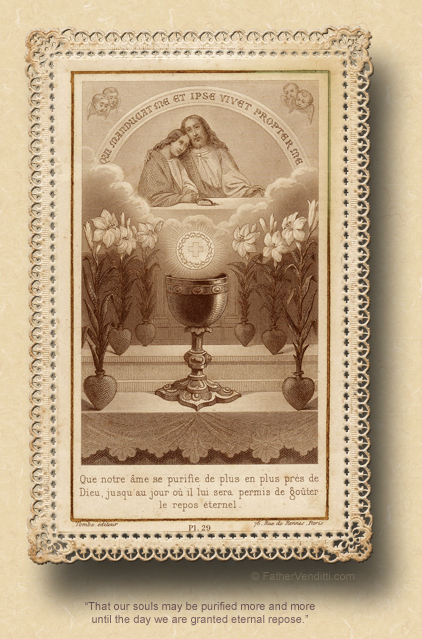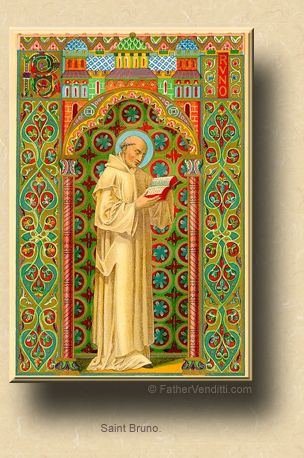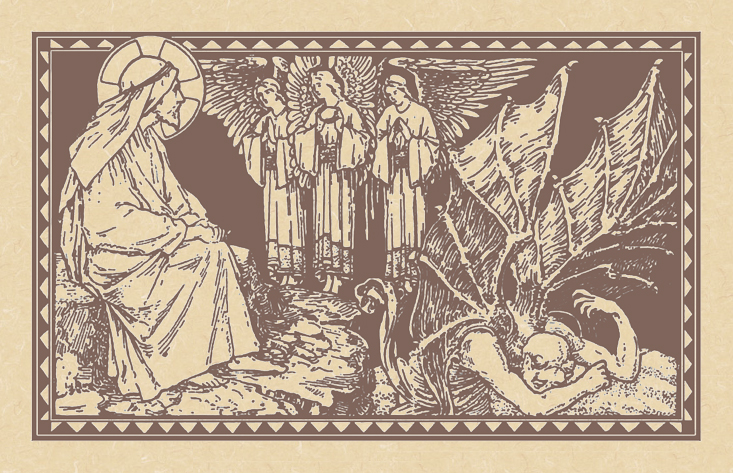Nobody Likes a Tattletale.
The First Day of Lent, known as Ash Wednesday.*
Lessons from the feria, according to the ordinary form of the Roman Rite:
• Joel 2: 12-18.
• Psalm 51: 3-6, 12-14, 17.**
• II Corinthians 5: 20—6: 2.
• Matthew 6: 1-6, 16-18.
Lessons from the feria, according to the extraordinary form of the Roman Rite:
• Joel 2: 12-19.
• Psalm 56: 2, 4.
• Psalm 102: 10.
• Matthew 6: 16-21.
The First Wednesday of the Great Fast; and, the Feast of Our Holy Father Leo, Pope of Rome.
Lessons from the triodion for the Presanctified, according to the typicon of the Byzantine-Ruthenian Rite:***
• Genesis 1: 24—2: 3.
• Proverbs 2: 1-21.
FatherVenditti.com
|
 2:07 PM 2/18/2015 — The last time I was privileged to have Holy Mass with you—which, because of the weather, was quite some time ago, in seems—I had spoken very briefly about the Septuagesima Season in the extraordinary form,—the Byzantines call it the Triodion—a pre-Lenten season in which we ease ourselves into a spirit of self-denial. It was suppressed in the ordinary form so that we plunge right into Lent on Ash Wednesday without much of a preparation at all; and, I had mentioned that, for those of you whose experience is exclusively with the post-Conciliar Liturgy, the idea of a pre-Lenten season might seem foreign and just a bit of overkill; but, to our ancestors in the faith, particularly in Eastern Europe where many of these customs developed, this all made perfect sense. The Catholics of that time lived mostly an agrarian life where the winters were long and harsh. There wasn’t a lot of hard manual labor that could be done; so, it wasn’t difficult for them to turn their minds and hearts to spiritual things. Of course, our circumstances are different today. Our winters may still be long and harsh;—at least from our perspective—but life goes on no matter how much snow falls or how impossible the frozen soil is to turn: we have to get up, we have to go to work, we have to cook the food, we have to clean the house, we have to yell at the kids, we have to yell at our spouse, we have to do all the things we normally do. We are not naturally drawn by the season to retreat into ourselves and contemplate the things of God more; which, when you think about it, makes these traditions even more important today. 2:07 PM 2/18/2015 — The last time I was privileged to have Holy Mass with you—which, because of the weather, was quite some time ago, in seems—I had spoken very briefly about the Septuagesima Season in the extraordinary form,—the Byzantines call it the Triodion—a pre-Lenten season in which we ease ourselves into a spirit of self-denial. It was suppressed in the ordinary form so that we plunge right into Lent on Ash Wednesday without much of a preparation at all; and, I had mentioned that, for those of you whose experience is exclusively with the post-Conciliar Liturgy, the idea of a pre-Lenten season might seem foreign and just a bit of overkill; but, to our ancestors in the faith, particularly in Eastern Europe where many of these customs developed, this all made perfect sense. The Catholics of that time lived mostly an agrarian life where the winters were long and harsh. There wasn’t a lot of hard manual labor that could be done; so, it wasn’t difficult for them to turn their minds and hearts to spiritual things. Of course, our circumstances are different today. Our winters may still be long and harsh;—at least from our perspective—but life goes on no matter how much snow falls or how impossible the frozen soil is to turn: we have to get up, we have to go to work, we have to cook the food, we have to clean the house, we have to yell at the kids, we have to yell at our spouse, we have to do all the things we normally do. We are not naturally drawn by the season to retreat into ourselves and contemplate the things of God more; which, when you think about it, makes these traditions even more important today.
I had also mentioned the specific custom of the Eastern Churches in which the two weeks before Lent, called Meatfare and Cheesefare—Meatfare being the last week during which they eat meat, and Cheesefare being the last week they eat dairy products, abstaining from both throughout the whole of Lent—call the faithful of those Churches to focus on very concrete things for a reason. Jesus didn’t just sit down and think about what it would be like to fast for forty days in the desert, and then contemplate how that might change him; he actually went there and actually fasted. And while we might be thankful that we are not Eastern Christians and don't have to do that kind of fasting, the relevancy of that example should not be dismissed out of hand. If my Lent consists of: “I’ll give up desserts; I’ll cut an hour of my TV time; I’ll say an extra ten minutes of prayers each night…”; that’s wonderful; but it’s not Lent, because it’s all just symbolic. A symbol—whether it be a picture or a word or a symbolic act—no matter how meaningful it may be, is still just a ghost. If it has no substance, it cannot change me concretely. But if my Lent is not just a symbol—if it is something which I allow to completely reorient my life, turning me away from the things of this world toward the things of God to the extent that my state if life permits—then, over the course of a lifetime of Lents, it can make the difference between heaven and hell. And that—at the risk of sounding amusingly tempered—is not insignificant.
Which brings us to the Gospel lesson for this day, which, on the surface, seems little more than some pragmatic admonitions by our Lord about the sincerity of our penitential acts: don't make a show in giving alms, don't make a spectacle of yourself when you pray, don't alter your appearance so everyone can see your mortification; nothing that we all don't know instinctively, though it does sometimes lead us to be a little judgmental of others: we go to work or to the store on Ash Wednesday and we see people walking around with enormous crosses of ash smeared on their foreheads, and we find ourselves thinking, “Is that person really living a Christian life, or is he or she just thinking superstitiously that getting ashes smeared on his head is some kind of magic charm that will protect him from “cooties”? How many times have we caught ourselves speaking among ourselves about what we call the “A & P Catholics,” those who go to church to get their ashes and their palms because something is being given out for free, but without any thought to what it is or what it means?  Then, if we're lucky, we realize that that kind of judgmental-ism is not at all in the spirit of Lent, and we stop ourselves. This happens to me all the time, when some simple soul will come here to the Shrine and be moved by what he or she experiences, and ends up in front of the statue of the Immaculate Heart, breaking out into song for all to hear; it's very difficult for me not to judge that person rather harshly and presume they're doing it to be seen and not simply out of devotion, since true devotion has no need to be seen by others, as our Lord Himself explains in the Gospel lesson. But then I have to stop myself and recognize that I don't have the gift of knowledge like the Curé of Ars, with the ability to see into someone's soul. I can shut them up because they're disturbing the prayer of others, but I can't judge them. Then, if we're lucky, we realize that that kind of judgmental-ism is not at all in the spirit of Lent, and we stop ourselves. This happens to me all the time, when some simple soul will come here to the Shrine and be moved by what he or she experiences, and ends up in front of the statue of the Immaculate Heart, breaking out into song for all to hear; it's very difficult for me not to judge that person rather harshly and presume they're doing it to be seen and not simply out of devotion, since true devotion has no need to be seen by others, as our Lord Himself explains in the Gospel lesson. But then I have to stop myself and recognize that I don't have the gift of knowledge like the Curé of Ars, with the ability to see into someone's soul. I can shut them up because they're disturbing the prayer of others, but I can't judge them.
During the season of Lent, we're going to be getting a lot of Scripture lessons at Holy Mass that pertain to mortification, fasting, prayer and sincerity in our actions; and, when we hear them, the temptation will always be to apply them to everyone but ourselves: we'll be sitting in the pew and hear our Lord say something, and the first thing that pops into our head is, “Gee, I hope So-and-so heard that”; we often don't bother to ask whether we heard it ourselves. It reminds me of something I learned very early on when I was first discerning my vocation, and had experimented with the monastic life among the Carthusians, a community of hermits founded by St. Bruno. In his monastic rule, written in the year 1050, he makes a statement that I believe can be adapted as a suitable item for anyone's examination of conscience, particularly during Lent: he says that, whenever you see a brother doing anything that is forbidden,—whether it's conversing with a woman, or entering a shop, or eating meat, or anything at all the monks do not do—instead of running to the prior to “rat him out,” just assume he has permission; your job is to purify your own soul, not to police someone else's.
So, today we bless ashes made from the burning of the palms from last year's Palm Sunday; and, in a tradition that goes back a thousand years, we are marked with those ashes as a symbol of our desire to do penance and purify our lives. But, like all symbols, it has the potential to be meaningless if we receive it in a superstitious way, or if it's just there for others to see. Personally, I wash mine off after Mass, especially after what our Lord says in today's Gospel lesson about washing your face and not altering your appearance. I like the new translation, in which our Lord says, “anoint your head and wash your face”; the old translation said, “wash your face and comb your hair,” which didn't mean a whole lot to me. I'm not telling you that you should wash off your ashes; that's just what I do. But whether you wash them off or leave them there, don't forget that the mark on your head does no good if it is not accompanied by a mark on your soul; and, the best way to determine that is how you treat and judge others.

* In the ordinary form of the Roman Rite, Ash Wednesday is neither a solemnity nor feast, nor even a memorial; rather, it enjoys a unique character as a kind of ferial day but with special features pertaining to its role as the first day of Lent. There has never been an obligation pertaining to this day
In the extraordinary form of the Roman Rite, Ash Wednesday is a feria of the first class. There has never been an obligation attached to it.
** In the Greek Psalter, this would be Psalm 50, known throughout most of Christendom as the chief Penitential Psalm. It's designation here as Psalm 51 reflects the current Missal's use of the Hebrew Psalter.
*** In the Byzantine-Ruthenian Rite, the first day of the Great Fast (Lent) is always on the Monday following Cheesefare Sunday. The Divine Liturgy is not celebrated during the weekdays of the Great Fast, and the Divine Liturgy of Presanctified Gifts, a celebration of Solelmn Vespers with Holy Communion, is celebrated in its stead on Wednesday and Friday evenings, with a shorter service—or no service at all—on the other weekdays. The readings given here are read at the Presanctified this evening, and do not include a Gospel lesson; a Gospel lesson would only be included on certain feasts, or during Holy Week.
|

